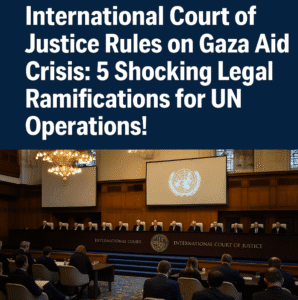International Court of Justice Rules on Gaza Aid Crisis: 5 Shocking Legal Ramifications for UN Operations!
The International Court of Justice (ICJ) concluded a pivotal week of hearings examining Israel’s legal obligations to ensure humanitarian aid reaches Gaza and the occupied West Bank, amid a catastrophic collapse of Gaza’s aid system. Triggered by a UN request, the case scrutinizes Israel’s 2024 blockade of essential supplies and its suspension of UNRWA, the primary aid provider for Palestinians, over contested claims of Hamas ties. The hearings carry global significance, as the ICJ’s advisory opinion could redefine legal protections for UN operations in conflict zones, deterring states from politicizing humanitarian access. Israel, absent from proceedings, defended its actions as self-defense in written submissions, while Palestinian representatives framed the case as part of a broader struggle for self-determination.
Though non-binding, the court’s ruling may pressure Israel to ease restrictions and influence donor support for UNRWA, which sustains 5.9 million Palestinian refugees. The decision also risks deepening Israel’s diplomatic isolation if it reaffirms the court’s 2023 finding that its occupation violates international law. Ultimately, the case tests the global community’s commitment to upholding humanitarian law as famine and disease ravage Gaza, with lasting implications for UN legitimacy in crises worldwide.

International Court of Justice Rules on Gaza Aid Crisis: 5 Shocking Legal Ramifications for UN Operations!
As the International Court of Justice (ICJ) concludes a landmark week of hearings, the world’s attention turns to the deepening humanitarian catastrophe in Gaza and the legal obligations of Israel to facilitate aid delivery. The hearings, prompted by a UN General Assembly request, seek clarity on Israel’s duties under international law to ensure humanitarian access to Gaza and the occupied West Bank. The case could reshape global understanding of UN agencies’ legal protections and their role in conflict zones.
A Crisis at Breaking Point
Gaza’s humanitarian system teeters on collapse. Since March 2024, Israel has blocked critical supplies—food, fuel, and medicine—while escalating military operations compound suffering. Over 2.2 million Palestinians face severe food insecurity, with famine conditions reported in northern Gaza. Hospitals, deprived of essentials, struggle to treat injuries and disease outbreaks. The UN Relief and Works Agency (UNRWA), the primary aid provider for Palestinians, has been barred from operating since January, following Israeli allegations of Hamas ties—a claim UNRWA vehemently denies.
Legal Stakes Beyond Gaza
At the heart of the hearings lies a question with global ramifications: To what extent must host states accommodate UN operations under international law? The ICJ’s advisory opinion could redefine the immunities and privileges of UN personnel, particularly in hostile environments.
- UNRWA’s Critical Role: Established in 1949, UNRWA supports 5.9 million Palestinian refugees across Gaza, the West Bank, Jordan, Lebanon, and Syria. Its exclusion from Gaza has crippled aid distribution, with alternative channels failing to meet needs.
- Precedent for Global Missions: A ruling affirming UN agencies’ legal protections could deter states from obstructing missions in conflict zones like Yemen, Sudan, or Ukraine. Conversely, ambiguity might embolden governments to politicize humanitarian access.
Mike Becker, an international law scholar at Trinity College Dublin, underscores the case’s significance: “This isn’t just about Gaza. It’s about whether the UN can operate without states arbitrarily curtailing its work.”
Israel’s Defense and Palestinian Advocacy
Israel boycotted the hearings but submitted a 38-page brief defending its actions as necessary for national security. It argues that UNRWA’s alleged Hamas links justify its suspension, framing the ICJ case as biased. Foreign Minister Gideon Sa’ar accused the UN of “weaponizing international law” against Israel’s right to self-defense.
Palestinian representatives, meanwhile, portrayed the hearings as part of a broader struggle for self-determination. Riyad Mansour, Palestine’s UN envoy, stated, “This is another step toward justice for a people denied their rights for decades.” The Palestinian legal team emphasized Israel’s obligation under the Fourth Geneva Convention to ensure civilian welfare in occupied territories.
The ICJ’s Delicate Balance
While ICJ opinions are non-binding, they carry moral and political weight. In 2004, the court ruled Israel’s West Bank barrier illegal, a decision ignored by Israel but cited globally to condemn settlement expansion. This case could similarly isolate Israel diplomatically if the court finds it violates humanitarian law.
Juliette McIntyre, a law professor at the University of South Australia, notes the hearings build on the ICJ’s 2023 ruling that Israel’s occupation is unlawful. “The court is methodically dismantling legal justifications for Israel’s policies,” she says.
What Comes Next?
The ICJ’s opinion, expected within months, will likely:
- Clarify states’ obligations to enable UN operations.
- Address whether aid restrictions constitute collective punishment—a war crime.
- Influence donor decisions on funding UNRWA, which saw suspensions by the U.S. and others earlier this year.
A Test for Global Governance
This case transcends the Israel-Palestine conflict. It challenges the international community to uphold humanitarian principles amid rising geopolitical fragmentation. As Becker warns, “Every breach of these norms weakens them. The ICJ must reinforce that law, not power, governs aid access.”
For Gaza’s civilians, the stakes are existential. For the UN, the ruling could either fortify its role in crises or expose its vulnerability to political whims. The world now waits to see whether the court’s voice can pierce the fog of war—and indifference.
You must be logged in to post a comment.